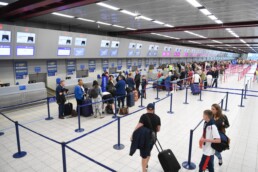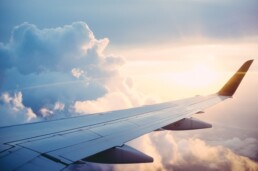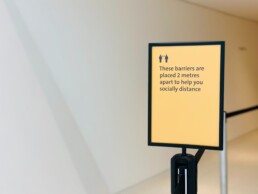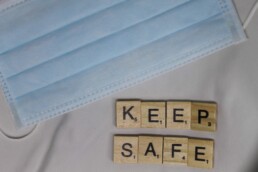How Niche Travel Markets Are Thriving And What You Can Learn From Them
As travel has become more difficult to understand during the current crisis we are in, there are many travel niches that have proved to be the saviors of consumers. People will always have a desire to travel and continually are looking for the safest way to get out and enjoy themselves. Jeff Gayduk sits down with four industry insiders that each have their own foot in a niche travel market and explains how they have been continuing business as well as what has changed.Â
Nancy Schretter
Nancy Schretter is the founder and president of The Beacon Group, whose goals and market is travel, but more specifically family oriented trips along with groups. During the current crisis we are in, it has become increasingly frowned upon and harder to be going on vacations as it is a huge risk. But a big trend Schretter is seeing is the rise of road trips, especially within families in order to create a bubble to where they will ensure their safety. Options such as national parks, camping, RV trips, AirBnbs, and ranches have risen rapidly in popularity. Another key point is that it is not too late to book trips for upcoming holidays, there are still a lot of hot deals for travel and it's always good to plan ahead of time.
Keith Snode
Keith Snode is the COO of Kaleidoscope Adventures, a company that focuses on middle to high school students and getting trips planned through the school. In terms of how trips are being planned during COVID-19, they essentially are not according to Snode. It has become increasingly difficult to get trips approved by school boards, and Snode is on the side of not focusing on extracurricular trips and rather putting all the focus on just getting schools open. Kaleidoscope has started putting more of their focus on groups they know they can work with, such as the homeschool community, groups within the school and the schools that are smaller such as drama clubs, bands, and art clubs. As well as groups outside of school like youth and church groups that may be looking to go on local trips. This is due to there being no school board in which a trip would have to be approved through. Overall, Snode and his team are hopeful for the future and looking at all their options to get up and running again.
Alexander Gloss
Alexander Gloss is the CEO of China i2i Group which is based in Shanghai China. Being located in Shanghai has allowed Alexander to have a really unique insight and viewpoint on the travel industry and the entire COVID-19 crisis. Being able to hear and understand how China is doing relative to North America gives other companies an upper hand and what to expect or change. At the moment there is no international travel going on in China, yet domestic travel has exploded. This was due to cheap deals, and airlines giving almost free tickets to those looking to travel. Business in China for Alexander and China i2i has gone essentially back to normal, because of this Gloss says, there is hope for other countries and to just look to the future.
Jason Clement
Jason Clement is the founder and CEO of The Sports Facilities Management which has created a network of helping clients achieve whatever goals they set related to sports facilities. Focusing both on the youth and amateur markets of sports. The Sports Facilities Management has 20 facilities across 16 states, which has had its own problems for Clement. Due to regulations being different from state to state, Clement is having to work around 16 different governors guidelines and creating strategies that work for each state. Sports have had a large impact on the traveling market with many sports teams starting their seasons and fans as well as players looking to start up again. National events have proved to be much harder for Clement to kick start, but local outdoor events have been affirming that things are going to work out.
Things you Must-Do To Stay In Communication
Communication has been in the spotlight now more than ever with businesses coming up with innovative ways to communicate with their customers. Noreen Heron president of Heron Agency, Janet Isabelli founder of Isabelli Partners, Dakota Shultz co-founder of Agency 360, and Carol Fox president of Carol Fox and Associates came together to discuss their must-do things to communicate better to their customers in current times.
- Talk Directly to Customers
This may sound obvious but many businesses are not actively speaking directly with their customers. Posting on socials may let customers know about your business and the regulatory steps you are taking to keep them safe, but it is not enough. “I'm seeing a lot of signs and posters about safety precautions, but that takes the human aspect out of the business, use the voice of your employees to be more personal†says Dakota Shultz. Being intimate with customers gives them comfort. Customers are already uncomfortable with eating indoors, let them know what you're doing personally to make their experience the best it can be.Â
2. Know How to Communicate Safety Vs. the Experience
An issue many businesses are facing is trying to balance marketing their safety regulations and the experience. What's the right amount of balance between the two? Isabelli believes a 50/50 balance is key, showing your customers that you aren't putting safety to the side by giving it the same amount of attention you would the experience. While Heron thinks 60/40 is more in line with what people want, most customers are used to the guidelines now and at this point just want to focus on having a good time than worrying about the regulations stating “We are here to help youâ€.
 3. How to Plan For The FutureÂ
Many businesses are focusing on what to do in the future rather than worrying about re-opening or staying open right now if they are not able to. This is the wrong way to go about it because there is so much uncertainty on when and if things will go back to “normalâ€. Fox believes there is always a way to continue to bring content to customers stating “Try and do online shows rather than waiting and hopingâ€. The best way to figure out how to remain operating is simply ask the customers what makes them comfortable “take surveys instead of trying to assume what they want '' says Shultz. Being upfront can be one of the most powerful tools when trying to figure out what customers want, especially during such complicated times.
Your Production Guide To Going Online
Knowing how to move and execute an online or virtual event is becoming the new frontier, it's unknown and is constantly changing within a small period of time. Sean Denny, director of event, and production designer at LUXE productions has had plenty of experience with virtual production. Leading the charge in finding the most innovative way and techniques to keep viewers engaged, involved, and wanting more.
Denny defines the difference between a virtual event and a hybrid event. A virtual event being that “no one is gathered together†versus a hybrid event which involves a live crowd that is then being live streamed to others.
An important aspect about virtual events is that they “offer the least amount of options and least production valueâ€. Were all used to putting a silly virtual background in our zoom meeting, but that level of production is no longer sustainable.
Hybrid events have shown in the past to be the most powerful type of online event because of the fact it allows for a much higher production value. The downfall of this is that it can take weeks or months to plan out and get ready.
Deciding which of these two are better requires businesses to look at multiple factors. Those being current regulations, will local or international guests be attending? Is the content time sensitive? What is your budget? These four factors are how a business can strategically decide what type of event to host.
But, what is next? Everyone is sick of zoom calls and it has quickly become the standard way to communicate since COVID-19 has impacted our society. The zoom trend is already dying out and is becoming a “boring†tool when trying to engage an audience for an online event.
Jamie Grossman, president of Luxe Productions gives his thoughts on what new trends will start to be implemented moving forward. The first being augmented reality, utilizing the ability to build any kind of environment in order to engage the audience for longer. The downfall to using high quality technology to increase engagement is it has to be used correctly to be successful. “It doesn't matter how expensive the equipment used to capture an event or presentation is, if the content is not interesting it is not going to capture your audience†says Denny. Watching a computer screen rather than being there at the event is entirely different, the attention span of the viewer is significantly smaller. The solution to this Grossman says is “45 minutes tops†for a singular event to run.
Coronavirus Travel Sentiment Index - Latest Findings on How Americans are Approaching Travel Decision Making
Destination Analysis Inc. President & CEO, Erin Francis-Cummings gives an insightful presentation about data on tourism and travel trends in the United States. It's no surprise that COVID-19 has had a major impact on travel plans across the country. Nevertheless with a vaccine in progress, Americans are slowly feeling more confident to begin traveling again.
When Travelers were asked to describe in ‘one word’ how they felt about traveling during the pandemic, this is how they responded. In the first month they felt scared, in May they felt cautious, and now they feel cautious but excited.
Cummings shares some promising statistics that bring optimism for the travel industry. 52.2% of Americans have excitement and openness to travel and 78% have travel plans for the upcoming year. “There’s a lessening of fear and it has transmitted to travel,†said Cummings.
Looking back at findings from the summer, July and August were the peak travel months which mostly included college graduates and partners. Additionally, when traveling Americans were more reliant on hotels for safety information. 32% of these travelers stayed at 3-4 star hotels and 82.7% rated “satisfied†to “very satisfied†about their stays at hotels during a pandemic. In terms of operational practices wanted by guests, included well-explained cleaning procedures, hand sanitizers, and available face masks & wipes.
Due to current conditions, travelers had a decrease in their typical vacation spending. This was not due to restaurants or attractions being closed, but because travelers are purposely being more budget conscious. In addition, Cummings adds that offering discounts would cause a motivation in Americans to begin traveling.
When asked if a vaccine would change the attitude of traveling for Americans, 44.1% said yes and 47.5% said they would need to wait 3-12 months before getting the vaccine. In a Travel Sentiment Index used by Destination Analysis, it has found that those in rural areas, air travelers, cruise travelers and women are most marketable at the moment.
If you’re interested in this study, new findings come out every Monday morning or you can also visit the website at https://www.destinationanalysts.com/covid-19-insights/.
How Hotels are Making it Safe for Tourism, Meetings & Events
Illinois Hotel & Lodging Association President and CEO, Michael Jacobson weighs in on the struggles the tourism industry has been facing since the pandemic hit. Jacobson expresses that hotels were the first to be affected and are potentially going to be the last to recover. Yet, he has hopes of “opportunity and optimism†in our industry.
Jacobson, Senior Vice President of Hyatt, Steven Enselein and General Manager of Embassy Suites By Hilton Chicago - Downtown, Kathy Heneghan discuss hotel safety protocols, the adaption to change and the future for events including hybrid. Back in April hotel occupancy in Chicago was at 22% and has slowly started to recover with the most recent rate of 39% in July.
In terms of hotel and event safety, Hilton has partnered with Lysol and Mayo Clinic to start CleanStay standards. A program that is dedicated to innovative solutions during COVID-19. It includes a cleaning protocol with a verified checklist, an “event-ready seal†put on every door, ensuring vendors are compliant with social distancing guidelines, flexible contracts, sanitation stations and a safer food & beverage experience for the guests and chefs by incorporating plexiglass.
In addition, Hyatt Hotels have also incorporated a comprehensive plan. They have partnered with the Cleveland Clinic and the Global Biorisk Advisory Council (GBAC) to create a safe experience from arrival to departure. It specifically targets what guests can expect and what changes they may face. Hyatt has provided mobile check in, a digital key, limited capacity in elevators, social distancing in restaurants, clear entrances & exits, and having the flexibility of choosing a time for housekeeping.“Communication is key and we want guests to feel comfortable and safe,†Enseilein stated.
Both hotels are focusing on proper training of staff for all protocols including issued masks, social distancing markers and signage around the lobby reminding guests and staff of the requirements. “Lead with Hospitality,†Hanaghen states, to remind guests to not only wear a mask, but to also remind them of why it’s needed.
If there is a silver lining to COVID-19, Enseilen says collaboration and working together has been seen more in this era than ever before, a hybrid component will only expand events and this an opportunity to remember why we meet face to face.
Managing Through Uncertainty
Uncertainty is inevitable, but leadership takes time. Michelle Mason, President & CEO of Association Forum, Kim Mosley, President of American Specialty Toy Retailing Association, and Kimberly Barnes, President and CEO of the Magnificent Mile Association, discuss their experiences of managing through uncertainty.
We have all reacted differently to the problems this pandemic has caused throughout the year. Mosley immediately jumped into action and knew she needed to create partnerships to make sure kids still had the chance to be kids this summer. Her organization worked with local schools to give toys during their food drives and worked with children museums to create packages filled with fun activities to keep kids occupied. Barnes also worked with her association to provide meals to communities who were severely hit by Covid-19.
While the pandemic has been a prevalent issue in the industry, the recent movement of racial injustice has sparked conversation everywhere. They welcome John Hockman, Principal of McKinley Advisors, to present key 2020 research findings concerning diversity and inclusion within the work environment. “44% of members said they have witnessed, experienced–or both–harassment, discrimmiation or bias in the last year,†said Hockman. He urges companies to diversify their leadership, raise awareness beyond just the basics, and to do something. Organizations may be at different points in their journeys, but no matter where they are, it is vital that they do something to advance welcoming environments.
Both Mosley and Bares are senior leaders in the industry, and want to lead by example. They have used their real life experiences to better understand their workers and to create a welcoming work environment for all. They are both advocates of self-care, and want to make sure their workers are taking care of themselves and not feeling overwhelmed. Barnes states it’s important that executives tell themselves “I need a break, I need to get this work done, but I also need to live to fight another dayâ€. A company can only thrive if they truly care about their workers in every sense.
COVID Safe Businesses & Events: How to Keep Your Guests & Employees Secure
How will the future of safety and cleanliness look as we move forward? Global Biorisk Advisory Council (GBAC) Executive Director Patricia Olinger, Hyatt Americas Vice President of Operations Tim Obert, United Service Companies CEO Rick Simon, and GBAC Director Dr. Gavin Macgregor-Skinner discuss the safety procedures that have been created to combat COVID-19.
Olinger highlights the purpose of the GBAC is to “prepare, respond and recover.†The GBAC was created between 2014 and 2015 due to the Ebola outbreak. Additionally, the current global pandemic has caused new realizations for the GBAC, “we have real concerns and critical shifts,†said Olinger. As a response to the outbreak, the GBAC has created the GBAC STAR accreditation program. This program is a guide to help facilities demonstrate that they can provide specific practices and protocols in combating a pandemic. “We need to be prepared for what’s next and move-on from hygienic cleaning to pandemic awareness,†said Olinger.Â
Hyatt Hotels are GBAC STAR credited world-wide. In addition to the GBAC STAR credit, Hyatt has started a Global Cleanliness program that has implemented training via the GBAC, a hygiene leader at each property, global face mask coverings, and ensuring every property is engaged in the accreditation program.
Dr.Macgregor-Skinner weighs in on the importance of GBAC STAR and explains that obtaining this type of accreditation has helped with the approval of local governments. “If your event is following the GBAC protocols, it becomes easier for the local government to give you the green-light to open,†he says.
There’s uncertainty of what will happen a month from now, but the point to be made is the importance of planning during these current situations. Dr. Macgregor-Skinner expresses that we all need a “peace of mind†and that we’re doing the best we can do.
Moving forward, we need to get excited when events start happening, but asking the crucial questions of ‘how do we operate to the highest standards?’ and ‘are we protecting our occupants and the buildings?’ Most importantly Dr. Skinner says, is to focus on the health and wellness of our guests and occupants to show that we care.







